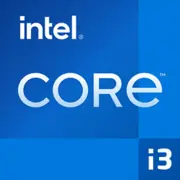Intel Core i3-7100H

Intel Core i3-7100H in 2025: Is it Worth Buying a Laptop with This Processor?
Despite being released in 2017, the Intel Core i3-7100H can still be found in budget laptops in 2025. This processor has become a symbol of affordable performance, but how relevant is it today? Let’s break it down.
Architecture and Technology: What's Inside?
The Intel Core i3-7100H belongs to the Kaby Lake generation (7th generation) and is manufactured using a 14nm process. Its key specifications include:
- 2 cores and 4 threads thanks to Hyper-Threading;
- Base clock speed: 3.0 GHz (no turbo mode);
- L3 cache: 3 MB;
- Integrated graphics: Intel HD 630 with a base frequency of 350 MHz and a maximum of 950 MHz.
The Kaby Lake architecture brought optimizations for 4K video (support for HEVC and VP9) and improved energy efficiency compared to previous generations. However, by 2025, the 14nm process looks outdated—modern Intel processors (like 13th and 14th generations) utilize 10nm and 7nm technologies, which enhance performance and reduce heat.
The built-in HD 630 graphics handle basic tasks:
- 4K video playback (but not encoding);
- Working with office applications;
- Low-demand games like Minecraft or Dota 2 on low settings (30-40 FPS).
Power Consumption and TDP: Balancing Power and Heat
The processor's TDP is 35W, typical for mobile H-series CPUs. This means:
- Laptops with such processors require active cooling (fan);
- Devices are rarely ultra-thin—more often, they are models with a 15.6-inch diagonal and weighing over 2 kg.
For comparison: modern Intel U-series processors (like the Core i5-1335U) have a TDP of 15W, allowing for lighter and quieter laptops.
Performance in Real-World Tasks
Geekbench 6 results (926 points in single-core and 1961 in multi-core mode) show that the i3-7100H lags behind modern counterparts but remains functional for basic scenarios.
Office Work
- Microsoft Office, Google Docs: the processor handles documents, spreadsheets, and presentations with no delays. Even with 10+ tabs open in Chrome, performance remains stable.
- Video Calls: Zoom/Teams work adequately, but background blur or AR effects may cause slowdowns.
Multimedia
- Streaming Video: 4K videos on YouTube play smoothly.
- Photo Editors: Lightroom or Photoshop can run, but processing RAW files will take 2-3 times longer than on a Core i5 of the 12th generation.
Gaming
Modern AAA titles like Cyberpunk 2077 or Elden Ring are not playable on the i3-7100H, even on minimal settings. However, for indie games or emulators (like Stardew Valley, Hollow Knight), the power is sufficient. More serious gaming will require a discrete graphics card (like the NVIDIA GTX 1650), but even then, the CPU will become a "bottleneck."
Usage Scenarios: Who is the i3-7100H Suitable For?
1. Students—for studying, text processing, and online courses.
2. Office Workers—if tasks do not require heavy software.
3. Older Users—for surfing, emails, and videos.
4. Backup Laptop—as a low-cost secondary device.
Not Suitable For:
- Gamers and streamers.
- Designers, programmers, engineers (CAD, compilers, rendering).
Battery Life: How Long Will It Last?
The average battery life of a laptop with an i3-7100H is 4-5 hours under moderate load (web surfing, YouTube). This is due to the 35W TDP and lack of modern energy-saving technologies. In comparison, laptops based on the Apple M1 (2020) can last up to 15 hours.
Energy efficiency of the CPU is supported by:
- Speed Shift (quick frequency switching);
- C-states (reducing power for inactive cores).
However, these technologies are less efficient than AMD's solutions (Precision Boost) or Intel's 12+ generations (Hybrid Architecture).
Comparison with Competitors
AMD Ryzen 3 3300U (2019)
- Pros of AMD: 4 cores/4 threads, Vega 6 graphics (30% more powerful than HD 630).
- Cons: higher prices for used devices.
Apple M1 (2020)
- Pros of Apple: 8 cores, 18-hour battery life, support for neural networks.
- Cons: macOS limits software compatibility.
Intel Core i3-1215U (2022)
- Pros: 6 cores (2 P-cores + 4 E-cores), Iris Xe graphics.
- Cons: laptops with this CPU start at $600.
Conclusion: The i3-7100H falls behind modern models but offers a better price point.
Pros and Cons of Intel Core i3-7100H
Strengths:
- Low cost of laptops (new models priced between $350-450).
- Sufficient power for everyday tasks.
- Proven reliability (architecture without "raw" technologies).
Weaknesses:
- No support for PCIe 4.0, Thunderbolt 4, Wi-Fi 6.
- Only 2 physical cores—multitasking is limited.
- High energy consumption for its class.
Recommendations for Choosing a Laptop
If you decide to buy a device with an i3-7100H in 2025, pay attention to:
1. Type of Laptop: choose versatile models (not gaming or ultrabooks). Examples: Lenovo IdeaPad 3, HP 15-dw2000.
2. RAM: at least 8GB (better 12GB for Windows 11).
3. Storage: only SSD (256GB or 512GB). HDD will slow down the system.
4. Screen: Full HD (1920×1080)—HD+ (1366×768) will degrade the experience.
5. Battery: look for models with 45Wh or more (e.g., ASUS VivoBook 15).
Prices: new laptops with the i3-7100H in 2025 are priced between $370-450.
Final Conclusion
The Intel Core i3-7100H is a processor for those seeking a budget-friendly, working laptop. It is suitable for:
- Learning and office work;
- As a second device for trips;
- If the budget is limited to $400.
Key advantages—price and proven stability. However, for $500-600, you can find laptops with more modern CPUs (like the AMD Ryzen 5 5500U) that will provide better performance and battery life. Buy the i3-7100H only if no other options are available.
Basic
CPU Specifications
Memory Specifications
GPU Specifications
Miscellaneous
Benchmarks
Compared to Other CPU
Share in social media
Or Link To Us
<a href="https://cputronic.com/cpu/intel-core-i3-7100h" target="_blank">Intel Core i3-7100H</a>